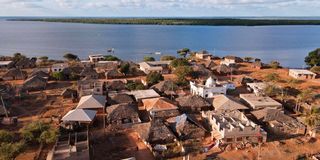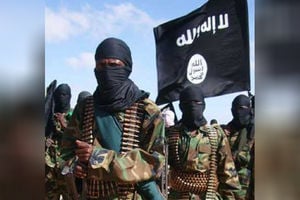
Village of Shanga Ishakani on Pate Island, Lamu County in this photo take on March 10, 2024.
Villagers at Ishakani on the Kenya-Somalia border are still trying to understand how their sleepy village was recently turned into a military camp by foreign soldiers from neighbouring Somalia.
Ishakani, a little-known hamlet with over 1000 years of existence, is considered one of Lamu’s oldest settlements.
Due to recurrent insecurity incidents caused by Al-Shabaab militants on the border in previous years, however, the village has always witnessed very few families staying there.
Currently, less than 50 families, mostly the Swahili people of Bajuni origin, who subsist on fishing, are living at Ishakani.
Tens of other families have migrated to Kiunga, about six kilometres from Ishakani, in search of crucial amenities like schools and hospitals now that the ones at Ishakani are not functioning.
But despite the numerous challenges faced and the low-class state of Ishakani, two weeks ago, more than 900 soldiers from the Somalia Federal government fled and found solace in the remote village.
This is after the soldiers (Somalia National Army-SNA) clashed with those of Jubaland regional forces in the Ras Kamboni camp, which is inside Somalia.
During an interview with Nation.Africa on Sunday, Barkale Madi, an elder at Ishakani, confirmed receiving hundreds of armed soldiers from the neighbouring Somalia at night on December 11, 2024.
Mr Madi had to surrender them to the Kenyan security forces living within Ishakani village where they were disarmed and housed temporarily at Ishakani Primary School.
“That night, there was tension. We saw the armed soldiers coming to our village without notice. There were so many and they arrived in batches. After introducing themselves, I had to cooperate now that we found these people in need of our assistance,” said Mr Madi.
“I took them to the nearby military camp where they were scrutinised, disarmed, and given a place to stay at our primary school compound. We continued receiving those soldiers until 2am. We were shocked to see our village abruptly turned into a military camp. We had over 900 Somali soldiers here.”
Fatma Ahmed, a resident, said the soldiers stayed for five days before they went back to Somalia after the situation was calmed.
Ms Ahmed now appeals to the state and well-wishers to come in and assist them that some amenities were destroyed during the Somalia soldiers’ stay at Ishakani.
“The few toilets that are here at Ishakani weren't enough to accommodate the hundreds of soldiers that fled to our village. Some toilets aren’t in good condition and need urgent repair. The surroundings are also not good as some soldiers even resorted to bush toileting. We fear a cholera outbreak here,” said Ms Ahmed.
Apart from the soldiers, about 343 families from Somalia have also sought refuge in Kiunga owing to the conflict and other reasons, the key among them being medication.
According to the Kenya Red Cross Society, 108 out of the 343 families had fled their homes in Somalia to Kiunga in Kenya for fear of being caught up in the clashes between the SNA and Jubaland regional forces.
By Sunday, the Kenya Red Cross Society had moved in to assist the displaced families with humanitarian aid, including food items.
Lamu County Kenya Red Cross Society Coordinator Abdulhakim Mahmoud confirmed that the 108 families had already received humanitarian assistance.
Mr Mahmoud, however, called for more aid as the families are still facing challenges, especially food, medication, and water treatments among other issues.
“The families from Somalia who migrated to Kiunga town are being hosted by Kenyan family friends and relatives. Kenya Red Cross has assisted them with both food and non-food items. But I still urge for more support, especially medical outreaches for the migrant families here in Kiunga and the residents of Ishakani,” said Mr Mahmoud.
A security source who talked to Nation. Africa on condition of anonymity as he is not authorized to speak to the press confirmed that the Somalia soldiers had all moved out of Ishakani so far.
It is worth noting that Kenya has been monitoring the situation with several push-for talks undertaken between Mogadishu and Kismayu with the aim of completely quelling the tensions.
On December 11 this year, drama broke out and escalated with the exchange of fire between the Somali National Army and the Jubaland Regional Forces, a situation that resulted in several troops from SNA being captured by those of Jubaland after surrendering at their Ras Kamboni camp.
“So far calm has resumed in Ishakani and the border areas at large. The tensions were a result of armed clashes between the Somalia federal government troops and Jubaland regional forces. Since then, more security agencies have been moved to the Kenya-Somalia border and the crisis that was building out of the clashes has been effectively addressed. No cause for worry,” said the security source.
Efforts to reach Lamu County Commissioner, Wesley Koech for a comment on the same were futile as his phone went unanswered.






